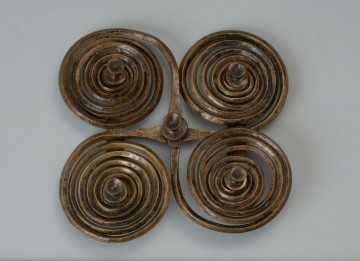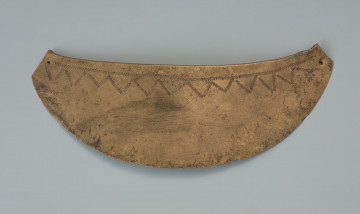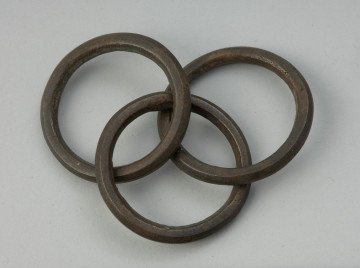
A cross buckle
around 750 p.n.e. — 550 p.n.e.
National Museum in Szczecin
Part of the collection: Bronze Age
This fibula is one of the most impressive and exciting clothing ornaments. Its two outer plates are covered with original concentric grooves and have additional centrally placed buttons, while the inner plate shows a circle with a cross inscribed in it. The drawing resembles a mandala - a symbol of transcendence, of what is divine. The fibula is an element of an equally unique treasure discovered in 1884 in a swamp. It consists of parts of a horse tack (2 bits, 14 buzzers, 14 buttons, 2 rings), two pairs of axe casting moulds, three fibulae, a magnificent razor and destructs of bronze and iron products. It should be emphasised that the marshy context of the treasure may indicate its special significance connected with the sphere of the sacrum and sacrificial offerings. The deposit ended up in the museum collection in Szczecin and was stored there until August 1944. Due to the approaching front and repeated Allied air raids, the treasure and other valuable relics were evacuated deep into Germany. It only returned to Szczecin in 2009 due to the Polish-German exchange of old archaeological collections. Most items from the Kiełpino deposit are characteristic of the Hallstatt culture, whose name derives from the Hallstatt cemetery in Austria. The presented clasp is maintained in this stylistic trend. Together with a twin specimen from the same hoard, it is unique in Poland.
Dorota Kozłowska
Author / creator
Dimensions
the entire object: height: 20 cm, width: 8 cm
Object type
fibula, costium adorment, pin (fastener)
Technique
casting
Material
bronze
Origin / acquisition method
legal transfer
Creation time / dating
Creation / finding place
Owner
National Museum in Szczecin
Identification number
Location / status

around 750 p.n.e. — 550 p.n.e.
National Museum in Szczecin

around 750 p.n.e. — 550 p.n.e.
National Museum in Szczecin

around 750 p.n.e. — 550 p.n.e.
National Museum in Szczecin
DISCOVER this TOPIC
Castle Museum in Łańcut
DISCOVER this PATH
Educational path